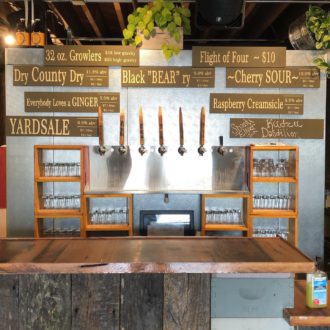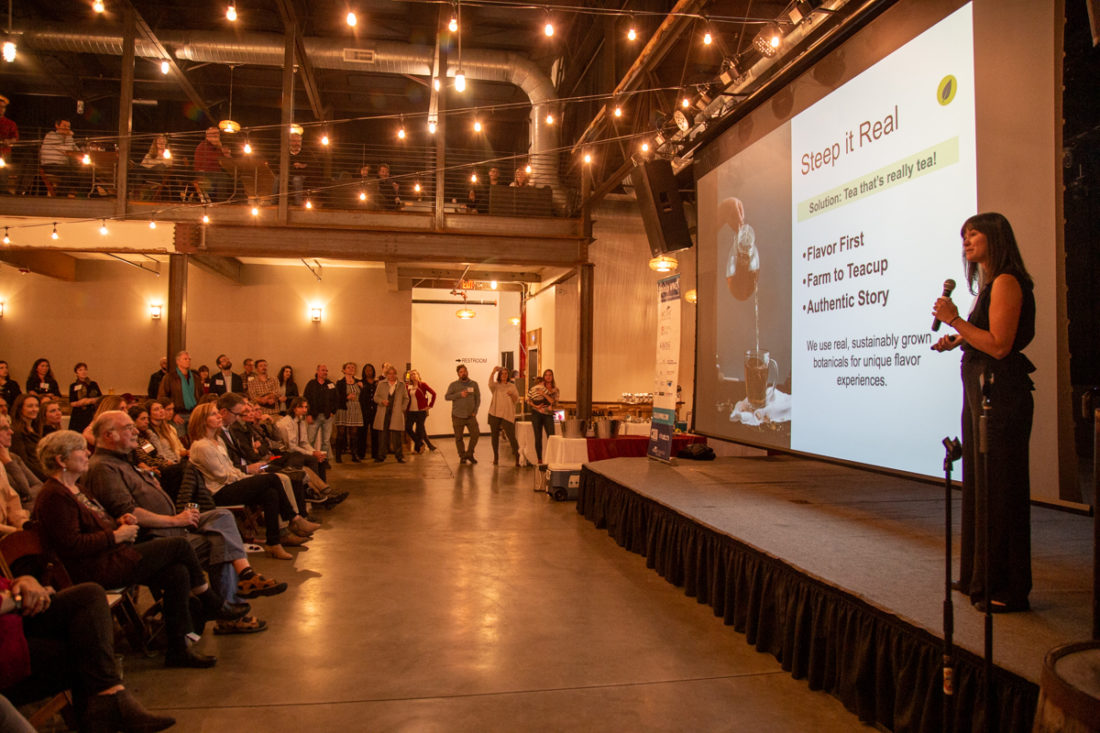Supporters of Asheville’s small businesses have long urged Western North Carolina to shop locally. But now, Mountain BizWorks wants to convince the mountain community to invest locally, too.
That’s why the Asheville-based nonprofit is hosting its second Mountain Raise Wednesday, Nov. 10, 5:30-8:30 p.m. at Hi-Wire Brewing. The event features five WNC businesses — Cardstalk, GreenLifeTech, North Cove Leisure Club, Spectra3D Technologies and SteakAger — that will present their fundraising goals to the community in the hopes of drawing local investors from all income levels and walks of life.
“When a community member invests in a business that is geographically close to them … it allows for that investor to actually, on an ongoing basis, influence the success of the business,” says Chris Grasinger, director of the nonprofit’s Invested program. As businesses succeed, he continues, so does the community as a whole, creating a cycle of economic growth that encourages more local investment.
The Mountain Raise name alludes to the barn raises of WNC’s agricultural past, Grasinger says. “The whole community comes out to help put up the framing together, and it’s this new beautiful barn [that] is part of that community,” he explains. “We thought of it as, we’re raising the mountains even higher through supporting these entrepreneurs.”
From sales to shares
Mountain Raise is the capstone event for two of Mountain BizWorks’ small-business courses: ScaleUp and Invested. Now in its sixth year, ScaleUp has helped 190 businesses develop growth strategies and identify funding opportunities. The Invested course, launched in 2018, helps businesses that are ready to raise capital negotiate federal Securities and Exchange Commission regulations, understand their fundraising options and put together campaigns.
The latter program was a direct response to a 2015 SEC decision that legalized regulation crowdfunding. Prior to that rule, only accredited investors — banks, loan companies, government programs and wealthy individuals — could legally invest in private companies not listed on a stock exchange. Now, anyone with disposable capital can invest in these businesses.
North Carolina has joined at least 35 states that have taken advantage of the SEC’s rule change. And in 2016, the General Assembly passed the N.C. Providing Access and Capital to Entrepreneurs Act to let businesses raise more funds from state residents.
“It really democratizes investment,” Asheville Tea Co. founder and owner Jessie Dean says of the new regulations. A graduate of both the ScaleUp and Invested courses, she presented at the first Mountain Raise event in November 2019, seeking funding to hire new employees and upgrade to more sustainable packaging for her company’s sustainably grown, additive-free teas.
Thanks in part to Mountain Raise, Asheville Tea Co. procured $80,000, enough to achieve both objectives. “It definitely gave me confidence to execute on our goals to build the business,” Dean says of the experience. As a local business owner, she adds, it meant even more that she could learn how to structure compelling presentations and raise funds through a local organization.

Aron Wehr, co-founder and co-owner of Wehrloom Honey and Meadery in Robbinsville with his wife, Jessica, appreciates how the Invested course helped him navigate SEC-compliant crowdfunding investment sites like Wefunder — and the mountain of complex legal paperwork needed to set up an SEC-compliant business. “I don’t think I would have jumped into [Wefunder] without the class,” he said.
Wehr got his Wefunder site running just days before pitching at the 2019 Mountain Raise, where he laid out the company’s plans to add a taproom in downtown Asheville. “A lot of times you start a business and … your main investors are Visa, MasterCard,” he says.
Instead, thanks to the event, Wehrloom raised $107,000 from 119 investors through January 2020. Wehr estimates that 10-20 of those investors contributed only $100 or $150.
Small businesses also have greater flexibility in how and when they provide returns when dealing with local investors instead of bank loans. Instead of offering equity in the business, Wehrloom decided to repay investors through revenue shares, which provide a portion of the company’s profits over time until a certain amount is paid.
That choice proved fortuitous when the pandemic delayed the planned opening of Wehrloom’s South Slope taproom for five months. Because its investor reimbursement was tied to revenue, the company didn’t have to make large fixed loan payments as its sales dipped during lockdown. And because revenue sharing sets no time limit for repayment, Wehrloom didn’t have to put the taproom plans on hold or cut costs in order to repay investors.
Although COVID-19 has curtailed the taproom’s hours of operation, Wehr believes the company remains on track to repay investors within the five- to seven-year timeframe he presented at Mountain Raise. Meanwhile, Wehrloom continues to grow: It’s about to start selling its carbonated honey wine in cans as well as bottles, and Wehr hopes to start accepting Bitcoin by the end of the year.
Raising inclusivity
Both Wehr and Dean will speak in more detail about their crowdfunding successes at this year’s Mountain Raise. In addition to alumni updates and this year’s pitches, multiple guest speakers will talk about the potential for regulation crowdfunding to impact the local community. One is William McGuire, whose Raleigh-based startup incubator Incolo specializes in consulting with small businesses, including Invested cohort members, on the process.
A “top-secret” guest, whom Mountain BizWorks spokesperson Justin Thompson describes as “the founder of a rapidly growing Black-owned enterprise,” is also scheduled to speak at the event. Kareen Boncales, the nonprofit’s director of entrepreneurship, notes that Mountain BizWorks has recently escalated its efforts to support entrepreneurs of color: Last year, the nonprofit launched a one-year program for business owners of color called the Catalyst Cohort.
Ten small businesses received one-on-one mentoring, team coaching, advice from guest presenters and $2,000. Mountain BizWorks is also piloting a Multicultural Catalyst Fund that will provide up to 20 entrepreneurs of color with loans of up to $50,000, coaching and assistance building credit.
“We’re actively working on how to design so that we can feed more of the graduates from the Catalyst Cohort and/or Catalyst Fund into the Invested program,” Grasinger says.
Each pitch at the Mountain Raise event will be only five minutes long, leaving plenty of opportunity for potential investors to ask questions. This year, entrepreneurs will take advantage of a new SEC rule adopted in March that allows companies to “test the waters” by pitching the details of a potential crowdfunding campaign to investors before filing legal documents. These nonbinding communications, Grasinger explains, will help businesses determine investor interest before committing to the substantial time and money needed to go through with a campaign.
To make sure all who are interested can hear the pitches, potential investors can attend Mountain Raise either in person using COVID-19 safety protocols or online. “One event curated for two separate audiences,” rather than a hybrid experience, is how Thompson characterizes the approach. Online participants will watch a livestream of the pitches as they’re delivered and get their own opportunity to speak directly to business owners in virtual interactive breakout rooms.
“It’s this really dynamic ecosystem that gets created,” says Boncales of the community relationships that investing develops between business owners and customers. “You’re investing more than just financially here.”




Before you comment
The comments section is here to provide a platform for civil dialogue on the issues we face together as a local community. Xpress is committed to offering this platform for all voices, but when the tone of the discussion gets nasty or strays off topic, we believe many people choose not to participate. Xpress editors are determined to moderate comments to ensure a constructive interchange is maintained. All comments judged not to be in keeping with the spirit of civil discourse will be removed and repeat violators will be banned. See here for our terms of service. Thank you for being part of this effort to promote respectful discussion.